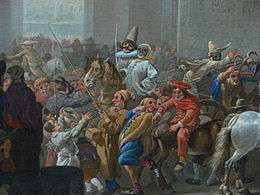J'ouvert
J'ouvert (/dʒuveɪ/) is a large street party held annually as part of Carnival in many Caribbean islands (primarily in the Lesser Antilles) and in areas where Caribbean peoples have immigrated.
| J'ouvert | |
|---|---|
| Type | National |
| Celebrations | Parades |
| Date | First Monday in August |
| Frequency | Annual |
J'ouvert is likely a gallicization of jou ouvè ([ʒuuvɛ]), the Antillean Creole French term meaning "dawn" or "daybreak", as this is the time at which the festival is typically held.[1]
History
J'ouvert is celebrated in many countries throughout the Caribbean. J'ouvert is also celebrated in many places outside the Caribbean as part of Carnival celebrations throughout the year, with the biggest celebrations happening in places around the world with large Caribbean ex-pat communities.[2][3]
Traditionally, the celebration involves calypso/soca bands and their followers dancing through the streets. The festival starts well before dawn and peaks a few hours after sunrise.[4]
Carnival was introduced to Trinidad by French settlers in 1783, a time of slavery.[5] Banned from the masquerade balls of the French, the enslaved people would stage their own mini-carnivals in their backyards — using their own rituals and folklore, but also imitating and sometimes mocking their masters' behavior at the masquerade balls.[6]
The origins of street parties associated with J'ouvert coincide with the emancipation from slavery in 1838. Emancipation provided Africans with the opportunity not only to participate in Carnival, but to embrace it as an expression of their newfound freedom. Some theorize that some J'ouvert traditions are carried forward in remembrance of civil disturbances in Port of Spain, Trinidad, when the people smeared themselves with oil or paint to avoid being recognized.
The traditions of J'ouvert vary widely throughout the Caribbean. In Trinidad and Tobago and Grenada, a part of the tradition involves smearing paint, mud or oil on the bodies of participants known as "Jab Jabs".[7][8][4][9]
In other countries, J'ouvert is celebrated on the first day of August (Emanicipation Day), and yet for other West Indian countries J'ouvert is observed the night before the daytime "Pretty Mas" parade. Pretty Mas, a bright and festive version of the celebration, features colorful feathers and beaded costumes and is more popular and commercially publicized. J'ouvert values the transgressive dirt, while Pretty Mas celebrates the transcendent glitter.[10] J'ouvert can further be contrasted with Pretty Mas such that J'ouvert is said to be for "the people" while Pretty Mas is intended for the establishment.
In popular culture
"J'OUVERT" is the title of the 10th track of Brockhampton's 4th studio album, iridescence.[11]
See also
- Trinidad Carnival
- Caribbean Carnival
- Lists of festivals in North America
References
- Allsopp, R. (1996). Dictionary of Caribbean English Usage. 1. Kingston: Oxford University Press. p. 776. ISBN 0-198-66152-5. Missing or empty
|title=(help) - "J'Ouvert Parade". NYC.gov. Retrieved 1 September 2019.
- "In pictures: Fifty years of the Notting Hill Carnival". BBC News. 28 August 2016. Retrieved 1 September 2019.
- Ehrenreich, Barbara (1 February 2009). "Up Close at Trinidad's Carnival". Smithsonian.com. Retrieved 1 September 2019.
- ""Mama Dis is Mas"". National Library and Information System Authority. 15 December 2014. Archived from the original on 11 February 2017. Retrieved 1 September 2019.
- "History of Carnival". Archived from the original on 31 August 2009. Retrieved 1 September 2019.
- "Traditional Mas Characters - Jab Molassie". National Carnival Commission of Trinidad and Tobago. Retrieved 1 September 2019.
- "Carnival - Traditional Carnival Characters". National Library and Information System Authority (Trinidad & Tobago). Archived from the original on 15 December 2014. Retrieved 1 September 2019.
- "A Carnival Theme Rooted in our Traditions by Dr. Nicole Phillip". GroundationGrenada.com. 18 August 2011. Retrieved 1 September 2019.
- Sheriff, Nai-Whedai (2014). "J'ouvert Speaks to the Present" (PDF). Journal of Emerging Dance Scholarship. World Dance Alliance. Retrieved 1 September 2019.
- @brckhmptn (13 September 2018). "SEPTEMBER 21ST" (Tweet). Retrieved 1 September 2019 – via Twitter.
